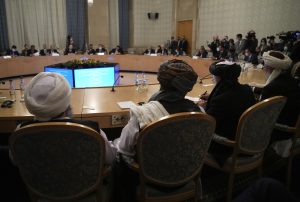Russia hosted talks on Afghanistan on Wednesday involving senior representatives of the Taliban and neighboring nations, a round of diplomacy that underlines Moscow’s clout.
Russian Foreign Minister Sergey Lavrov opened the talks and emphasized that “forming a really inclusive government fully reflecting the interests of not only all ethnic groups but all political forces of the country” is necessary to achieve a stable peace in Afghanistan.
Russia had worked for years to establish contacts with the Taliban, even though it designated the group a terror organization in 2003 and never took it of the list. Any contact with such groups is punishable under Russian law, but the Foreign Ministry has responded to questions about the apparent contradiction by saying that its exchanges with the Taliban are essential for helping stabilize Afghanistan.
Unlike many other countries, Russia hasn’t evacuated its embassy in Kabul and its ambassador has maintained regular contacts with the Taliban after they took over the Afghan capital in August.
Lavrov commended the Taliban for their efforts to stabilize the military-political situation in the country and ensure the operation of state structures.
“We are satisfied with the level of practical interaction with Afghan authorities, which allows [us] to effectively ensure security of Russian citizens in Afghanistan and unimpeded operation of our embassy in Kabul,” Lavrov said in his opening speech at the conference.
At the same time, he emphasized the importance of respecting human rights and pursuing well-balanced social policies, adding that he discussed those issues with the Taliban delegation before the talks.
Abdul Salam Hanafi, a deputy prime minister in the Taliban’s interim government, who attended Wednesday’s talks, said “the meeting is very important for stability of the entire region.”
Lavrov said that Russia would soon dispatch a shipment of humanitarian aid to Afghanistan and urged the international community to quickly mobilize resources to prevent a humanitarian crisis in the country.
The Soviet Union fought a 10-year war in Afghanistan that ended with its troops withdrawing in 1989. In recent years, Moscow has made a strong comeback as an influential power broker in international talks on Afghanistan, hosting the Taliban representatives and members of other factions for bilateral and multilateral meetings.
Along with the Taliban and other Afghan factions, the so-called Moscow format talks held since 2017 also include representatives of China, Pakistan, Iran, India, and ex-Soviet nations in Central Asia.
Wednesday’s talks were preceded earlier this week by a meeting of top diplomats from Russia, China, and Pakistan. The U.S., which is also part of that “extended troika” format, didn’t attend the meeting.
Last week, President Vladimir Putin noted that there must be no rush in officially recognizing the Taliban as the new rulers of Afghanistan, but emphasized the need to engage in talks with them.
At the same time, Putin and other Russian officials emphasized the threats posed by the Islamic State group and other militants based in northern Afghanistan, and noted that drug trafficking from Afghanistan will continue to present a challenge.
“Numerous terrorist groups, notably the Islamic State and al-Qaida, are trying to take advantage of the instability in the country, mounting bloody attacks,” Lavrov said. “There is a real danger of terrorism and drugs spilling into the neighboring nations under the guise of migration.”
Russia’s top diplomat urged the Taliban “not to allow the territory of Afghanistan from being used against the interests of any third countries, primarily its neighbors, our friends and allies in Central Asia.”
Russia has vowed to provide military assistance to its ex-Soviet allies in Central Asia to help counter the threats, and held a series of joint drills in Uzbekistan and Tajikistan that neighbor Afghanistan.
Another sweeping military exercise in Tajikistan involving 5,000 troops, more than 700 military vehicles and combat jets has started this week.
































